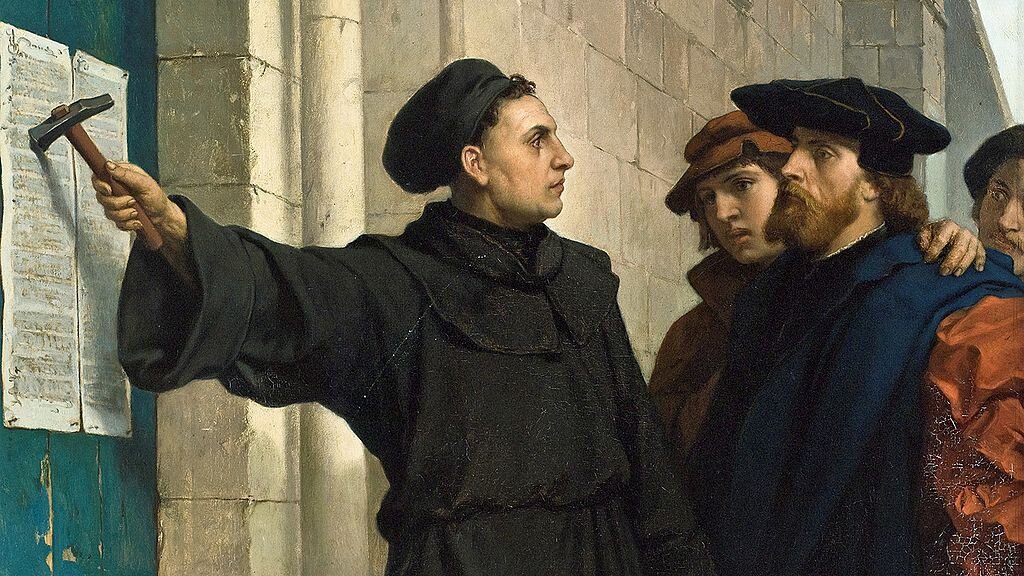Distinctively Lutheran
In 1517, Martin Luther nailed the 95 Theses in Wittenburg, Germany sparking the Protestant Reformation. We are not defined by the revolutionary spirit of the Reformation but by its reformative spirit. Namely, a renewed focus upon the Holy Scriptures as the sole source of authority for Christians as they had been confessed since the Early Church.
Because we value unity in belief and clarity of teaching, we retain several historic texts which explain and clarify what we believe on the core tenets of our theology.
This may all sound heady, but its really rather simple…
God Is Our Creator
“I believe in God the Father Almighty maker of heaven and earth.”
What does this mean? I believe that God has made me and all creatures; that He has given me my body and soul, eyes, ears, and all my members, my reason and all my senses, and still takes care of them. He also gives me clothing and shoes, food and drink, house and home, wife and children, land, animals, and all I have. He richly and daily provides me with all that I need to support this body and life. He defends me against all danger and guards and protects me from all evil. All this He does only out of fatherly, divine goodness and mercy, without any merit or worthiness in me. For all this it is my duty to thank and praise, serve and obey Him.
This is most certainly true.
Jesus Is Our Redeemer
“And in Jesus Christ, His only Son, our Lord, who was conceived by the Holy Spirit, born of the Virgin Mary, suffered under Pontius Pilate, was crucified, died and was buried. He descended into hell. The third day He rose again from the dead. He ascended into heaven and sits at the right hand of God, the Father Almighty. From thence He will come to judge the living and the dead.”
What does this mean? I believe that Jesus Christ, true God, begotten of the Father from eternity, and also true man, born of the Virgin Mary, is my Lord, who has redeemed me, a lost and condemned person, purchased and won me from all sins, from death, and from the power of the devil; not with gold or silver, but with His holy, precious blood and with His innocent suffering and death, that I may be His own and live under Him in His kingdom and serve Him in everlasting righteousness, innocence, and blessedness, just as He is risen from the dead, lives and reigns to all eternity.
We Are Sanctified By The Holy Spirit
“I believe in the Holy Spirit, the holy Christian church, the communion of saints, the forgiveness of sins, the resurrection of the body, and the life everlasting. Amen.”
What does this mean? I believe that I cannot by my own reason or strength believe in Jesus Christ, my Lord, or come to Him; but the Holy Spirit has called me by the Gospel, enlightened me with His gifts, sanctified and kept me in the true faith. In the same way He calls, gathers, enlightens, and sanctifies the whole Christian church on earth, and keeps it with Jesus Christ in the one true faith. In this Christian church He daily and richly forgives all my sins and the sins of all believers. On the Last Day He will raise me and all the dead, and give eternal life to me and all believers in Christ.
About Our Sacramental Theology
When we confess that we are sanctified by the Holy Spirit we confess that it “calls, gathers, enlightens, and sanctifies the whole Christian church”. Through the Gospel — that is, through forgiveness of sins in Christ — which is offered through means called “The Means of Grace” or “Sacraments”.
What makes something a “Sacrament”?
Instituted by the command of Christ.
A word of promise joined to a visible element.
That bestows the forgiveness of sins.
Which Are These Sacraments?
Baptism
Baptism is not just plain water, but it is the water included in God’s command and combined with God’s word.
Christ our Lord says in the last chapter of Matthew: “Therefore go and make disciples of all nations, baptizing them in the name of the Father and of the Son and of the Holy Spirit.” (Matt. 28:19)
The Sacrament of the Altar
It is the true body and blood of our Lord Jesus Christ under the bread and wine, instituted by Christ Himself for us Christians to eat and to drink.
“Given and shed for you for the forgiveness of sins,” show us that in the Sacrament forgiveness of sins, life, and salvation are given us through these words. For where there is forgiveness of sins, there is also life and salvation.
Confession and Absolution
Confession has two parts. First, that we confess our sins, and second, that we receive absolution, that is, forgiveness, from the pastor as from God Himself, not doubting, but firmly believing that by it our sins are forgiven before God in heaven.
The Lord Jesus breathed on His disciples and said, “Receive the Holy Spirit. If you forgive anyone his sins, they are forgiven; if you do not forgive them, they are not forgiven.” (John 20:22–23)

